China in TPP 'a good thing': ex-Rep
Updated: 2015-03-09 11:02
By Hua Shengdun in Washington(China Daily USA)
|
||||||||
It would be a positive development if China joined in the Trans-Pacific Partnership trade agreement, said a former US Congresswoman in Washington.
"I see eventually the TPP including China, and I personally think that would be a good thing," Jane Harman, former member of the House and current president and CEO of the Woodrow Wilson International Center for Scholars, told China Daily at a US Department of State foreign press center briefing on March 5.
Harman said China should in some time period become part of TPP, because "countries in Asia plus the US, plus others working, trading together, all of those countries have large or even larger trade relationships with China".
Guided by the US since 2005, the TPP is now an Asia-Pacific region regulatory and investment treaty between 12 countries: Australia, Brunei, Canada, Chile, Japan, Malaysia, Mexico, New Zealand, Peru, Singapore, the US and Vietnam.
According to Reuters, the TPP agreement would establish a free trade bloc encompassing about 800 million people and almost 40 percent of the global economy. China, the largest international trade country in the world, has yet to be included.
China's vice-finance minister Zhu Guangyao said last year that the Asia-Pacific trade deal would be "incomplete" in the long term without Beijing's participation.
"We want to see the real development of the TPP here," Zhu said last October. "We want to see the Chinese economy more integrated with the global system."
It was widely regarded as a turning point in Chinese official's attitude towards the TPP, a switch from reckoning the treaty as being part of a US containment strategy against China to showing an interest in a regional free trade agreement.
Catherine Novelli, Under Secretary of State for Economic Growth, Energy and the Environment, said on March 3 that the US would support China's active engagement in the region.
"We support China being robust in that region. That's where China is," she said. "We are also engaged directly with China. We have our bilateral investment treaty talks that are ongoing and are actually going very well and progressing."
Novelli also said that the US needed to conclude the negotiations first before moving on with any other countries becoming part of it. And newcomers will have to meet high standards to meet the "stringent and high-quality" agreement.
Hugh Stephens, Senior Fellow at the Asia Pacific Foundation of Canada and vice-chair of the Canadian National Committee on Pacific Economic Cooperation, said the TPP is still facing its own trouble.
He said while the recommitment to TPP completion by the twelve leaders in Beijing is "an important demonstration of political will", the dragging TPP talks will only achieve a breakthrough once President Obama receives the Trade Promotion Authority from Congress that "would allow it to conclude an agreement without having to subject the final text to possible Congressional amendments".
China has also been pushing its new trade mode, the "one belt, one road initiative" by Chinese President Xi Jinping since 2013.
It refers to the New Silk Road Economic Belt that links China and Europe through Central and Western Asia and the 21st Century Maritime Silk Road, which connects China with Southeast Asian countries, Africa and Europe.
During Xi's four-country Asia trip last September, he proposed to "closely knit China's competitive industries with the geographical features and the development needs of Tajikistan, the Maldives, Sri Lanka and India".
Sheng Yang in Washington contributed to this story.

 Apple unveiled 1st wearable watch
Apple unveiled 1st wearable watch
 Children perform 'Ballad of Mulan' in NYC
Children perform 'Ballad of Mulan' in NYC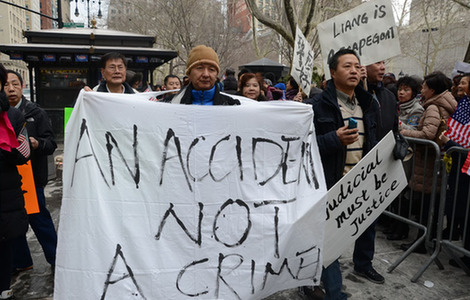
 Rally in New York supports indicted Chinese-American police officer
Rally in New York supports indicted Chinese-American police officer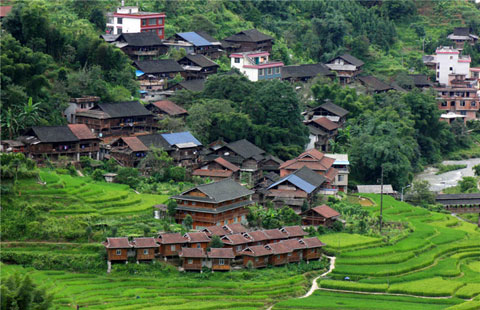
 Traditional villages: Home of Chinese culture
Traditional villages: Home of Chinese culture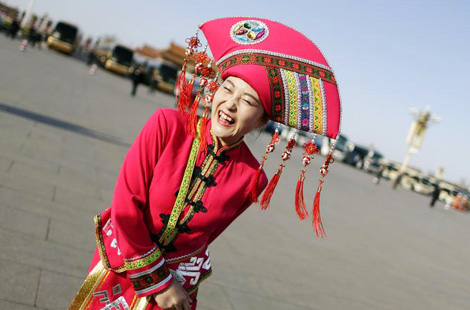
 Daily snapshots of 'two sessions' - March 8
Daily snapshots of 'two sessions' - March 8
 Brazilian soccer stars prosper in China
Brazilian soccer stars prosper in China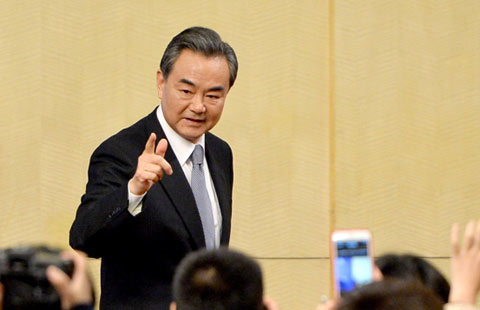
 Chinese FM gives press conference for NPC session
Chinese FM gives press conference for NPC session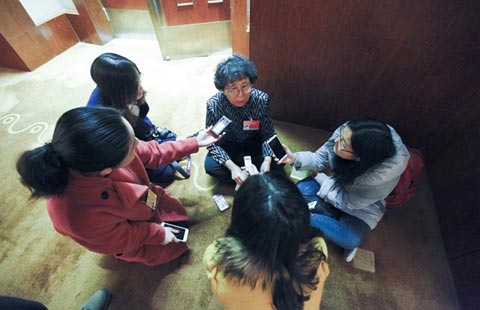
 One Minute: 'Bizarre' TV scenes and subsidies for hiring women
One Minute: 'Bizarre' TV scenes and subsidies for hiring women
Most Viewed
Editor's Picks

|

|

|

|

|

|
Today's Top News
US slaps tougher sanctions on Venezuelan officials
Xiaomi to enter bullish Brazilian market
Clinton remains silent as questions mount over email scandal
Prince Charles, Camilla to visit Washington-area sites
China, US should look forward with sincerity
China in TPP 'a good thing': ex-Rep
University of Virginia opens office in China
China to stricly regulate e-commerce industry
US Weekly

|

|







